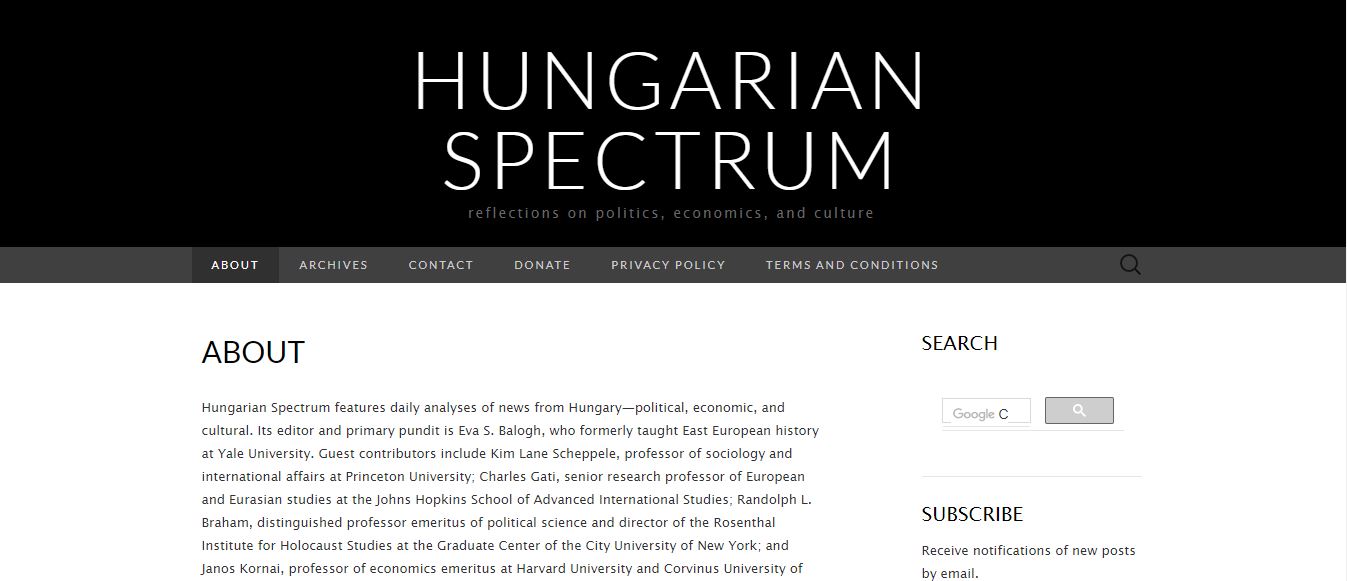Opinion: Is The Orbán Regime A “Hybrid Political System”?
- 20 Aug 2018 9:20 AM
- Hungarian Spectrum

Filippov is a Ph.D. candidate at Central European University. A few years ago he was on ATV frequently as part of a two-person team of political analysts, but then he more or less disappeared from public view.
This essay brought him back into the limelight because, shortly after its publication, a couple of political analysts took issue with his findings.
The essay is long, but I can summarize its message in a couple of sentences. First, Hungary is neither a dictatorship nor a democracy; it is a hybrid system. Second, it is just one of the countless such systems that have sprung up in the last few decades.
The Orbán regime is neither “mutated fascism,” as Rudolf Ungváry calls it, nor a “post-communist mafia state,” as defined by Bálint Magyar. In fact, these “obsolete comparisons” and “half-truths” distort our perception and discredit our analyses.
How did these hybrid political systems come into being? Following the end of the cold war, most autocrats realized that “democracy cannot be defeated by ideological means” because the great majority of people would like to live in a democracy.
But they also realized that democratic institutions don’t need to be destroyed. Instead, they can be transformed into harmless entities that ensure the democratic trappings of their regime.
These regimes used to be called “illiberal democracies” or “controlled democracies,” but today they are mostly labelled “hybrid systems,” which is “an admixture of democratic institutions and the anti-democratic exercise of power politics, a transition between democracy and pure dictatorship.”
In places Filippov calls these political systems “competitive hybrid regimes,” a term he borrowed from Steven Levinsky and Lucan Way’s work Competitive Authoritarianism. It simply means that periodically elections take place, which at times may pose a danger to the very existence of the hybrid system.
These elections therefore do not take place on a level playing field. Still, Filippov insists that with a talented opposition such a hybrid system can be toppled.
Filippov describes the essential core of all hybrid systems. He uses the term “hybrid franchise,” which I believe means that those 50 or so hybrid systems that apparently exist today follow a common recipe.
(1) Direct oppression is to be avoided. For example, instead of abolishing the constitutional court it is enough to limit its competence.Limited freedom of expression is allowed. Democratic props are useful for the regime because they mislead the ordinary citizen into believing that democracy still exists.
(2) Relative openness is actually a source of strength for the regime because through public opinion polls and critical articles in the opposition press the regime can gauge the public mood and adjust its policies.
(3) The slogans and institutions of democracy are the most effective weapon against democracy. Here I believe Filippov is referring to the government’s predilection for talking about the overwhelming support the party and government enjoy as a justification for their own disregard of legitimate demands.
(4) Force can be privatized and outsourced. These regimes don’t need Gestapos, NKVDs or ÁVOs; they use private security services, football hooligans.
(5) NGOs don’t need to be banned; it is enough to break them. In the last couple of decades more than 50 hybrid regimes passed laws limiting the activities of civic groups.
Filippov maintains that it is important to recognize that the hybrid system bears very little resemblance to the “classic” twentieth-century dictatorships; “they can in no way be compared to Nazi Germany or Stalin’s Soviet Union.”
In Hungary, both sides exaggerate. The opposition rightly points to the degradation of democracy and the rule of law, but “the other side is correct when it finds the comparison to dictatorship, fascism, and Stalinism to be an overstatement, pointing to the lack of brutal tyranny and the existence of elections.”
In Filippov’s opinion, “groundless comparisons to genocidal regimes that rejected all forms of pluralism discredit any criticism at the outset.”
Filippov severely criticizes the present opposition, which acts as if it were conducting political activity in a “consolidated democracy.”
Opposition parties give press conferences, they submit legislative proposals, they interpellate, and in the morning or evening they give interviews on ATV. But “the task of politicians is the recapture of politics.”
Filippov warns that “a hybrid regime is not the terrain of press-conference politics.” Unfortunately, he doesn’t divulge the proper way of handling this so-called hybrid system.
This is a huge topic and here I’m just scraping the surface, but I have serious problems with the schema Filippov adopted from those political scientists in the United States and elsewhere who deal with the concept of hybrid political systems. I think that “hybrid” is the wrong term to describe these autocratic regimes.
A hybrid is an admixture of two elements, in this case dictatorship and democracy, but Filippov admits that the regime “has hacked” the democratic institutions. Hacking in his use of the word means taking over.
But if a dictatorial power has destroyed the very essence of democratic institutions, we cannot talk about an admixture of these two components. And certainly we cannot talk about—as Filippov does—the transition between dictatorship and democracy. At one point he ponders just when the Orbán regime fell into the category of a hybrid system.
The fact is that Viktor Orbán, almost immediately after taking office, announced his intention to establish a new kind of political system, the “System of National Cooperation.” What happened later was the rapid implementation of his plan.
It didn’t take long for critics to find fault with Gábor Filippov’s definition of Orbán’s regime as a “hybrid political system.”
This opinion does not necessarily represent the views of XpatLoop.com or the publisher. Your opinions are welcome too - for editorial review before possible publication online Click here to Share Your Story
MTI Photo
































LATEST NEWS IN current affairs